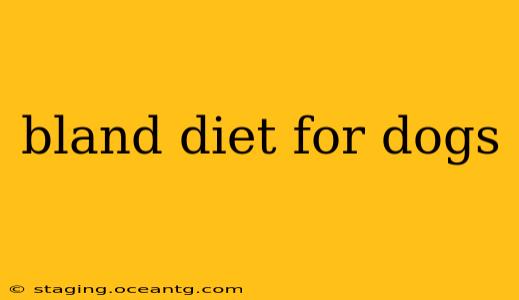A bland diet for dogs is often recommended by veterinarians as a temporary measure to soothe upset stomachs, address diarrhea, or aid in recovery from gastrointestinal issues. While it might sound unappetizing, this simple diet focuses on easily digestible ingredients to allow the dog's digestive system to rest and heal. This guide will comprehensively cover everything you need to know about bland diets for dogs, helping you understand when it's appropriate, how to prepare it, and what to watch out for.
What is a Bland Diet for Dogs?
A bland diet for dog typically consists of easily digestible carbohydrates and a lean protein source. The goal is to minimize the strain on the digestive tract while providing essential nutrients. Common ingredients include plain cooked chicken (without skin or bones), plain cooked white rice, and boiled, skinless sweet potato. This simple combination is less likely to trigger allergic reactions or upset the stomach. Crucially, it avoids things that can exacerbate digestive problems like high fat, spices, and artificial additives.
When Should You Feed Your Dog a Bland Diet?
A veterinarian should always be consulted before starting your dog on any new diet, including a bland diet. However, some common scenarios where a bland diet may be recommended include:
- Acute Diarrhea: If your dog is experiencing sudden, severe diarrhea, a bland diet can help soothe the irritated intestinal tract and promote healing.
- Vomiting: Similar to diarrhea, vomiting can be a sign of gastrointestinal upset. A bland diet can help settle the stomach and reduce the frequency of vomiting episodes.
- Food Allergies or Sensitivities: While not a long-term solution, a bland diet can be helpful in identifying potential food allergens by eliminating common culprits. Once your vet rules out other causes for digestive issues, a gradual reintroduction of other foods can help pinpoint sensitivities.
- Post-Surgery Recovery: After surgery, especially gastrointestinal procedures, a bland diet aids in gentle recovery and allows the digestive system to regain its strength.
- Pancreatitis: This condition requires a low-fat diet, and a properly prepared bland diet can assist in recovery until the dog can tolerate their usual food.
What Ingredients Are in a Bland Diet for Dogs?
The core ingredients for a bland diet are usually:
- Cooked, skinless, boneless chicken breast: Provides a high-quality protein source that's easy to digest.
- Plain, cooked white rice: A simple carbohydrate that's gentle on the stomach.
- Boiled, skinless sweet potato: Adds fiber and nutrients while remaining easily digestible.
Important Note: Avoid adding any seasonings, fats, or oils to the bland diet. These can irritate the digestive system and negate the benefits of the bland food.
What are the benefits of a bland diet for dogs?
A bland diet is beneficial for dogs because it focuses on easily digestible ingredients that help settle upset stomachs, alleviate diarrhea, and aid in overall digestive health. It helps provide essential nutrients without triggering allergic reactions or further irritating the sensitive gut.
How long should I feed my dog a bland diet?
The duration of a bland diet depends on your dog's condition and your veterinarian's recommendations. Generally, a few days to a week may be sufficient for mild digestive upset. For more serious issues, it could extend longer. Always follow your vet's guidance.
Can I give my dog a bland diet long-term?
No, a bland diet is not intended for long-term feeding. While nutritious in the short-term, it lacks the variety and nutritional completeness of a balanced commercial dog food. Prolonged use may lead to nutritional deficiencies. It's crucial to transition back to a balanced diet under veterinary supervision once your dog's condition improves.
What should I do if my dog's condition doesn't improve on a bland diet?
If your dog's symptoms persist or worsen despite a bland diet, consult your veterinarian immediately. There may be underlying medical conditions requiring professional diagnosis and treatment.
Transitioning Off the Bland Diet
Once your dog is showing improvement, it's crucial to gradually reintroduce their regular food. This prevents further digestive upset. Start by mixing a small amount of their regular food with the bland diet, gradually increasing the proportion of regular food over several days. Monitor your dog closely for any signs of relapse.
Conclusion
A bland diet can be a helpful tool in managing certain gastrointestinal issues in dogs, but it should always be used under veterinary supervision. It's a temporary solution, and a balanced diet is essential for long-term health. By understanding its purpose, preparation, and limitations, you can help your canine companion through digestive difficulties and ensure their ongoing well-being. Remember, always consult your veterinarian before making any dietary changes for your dog.
